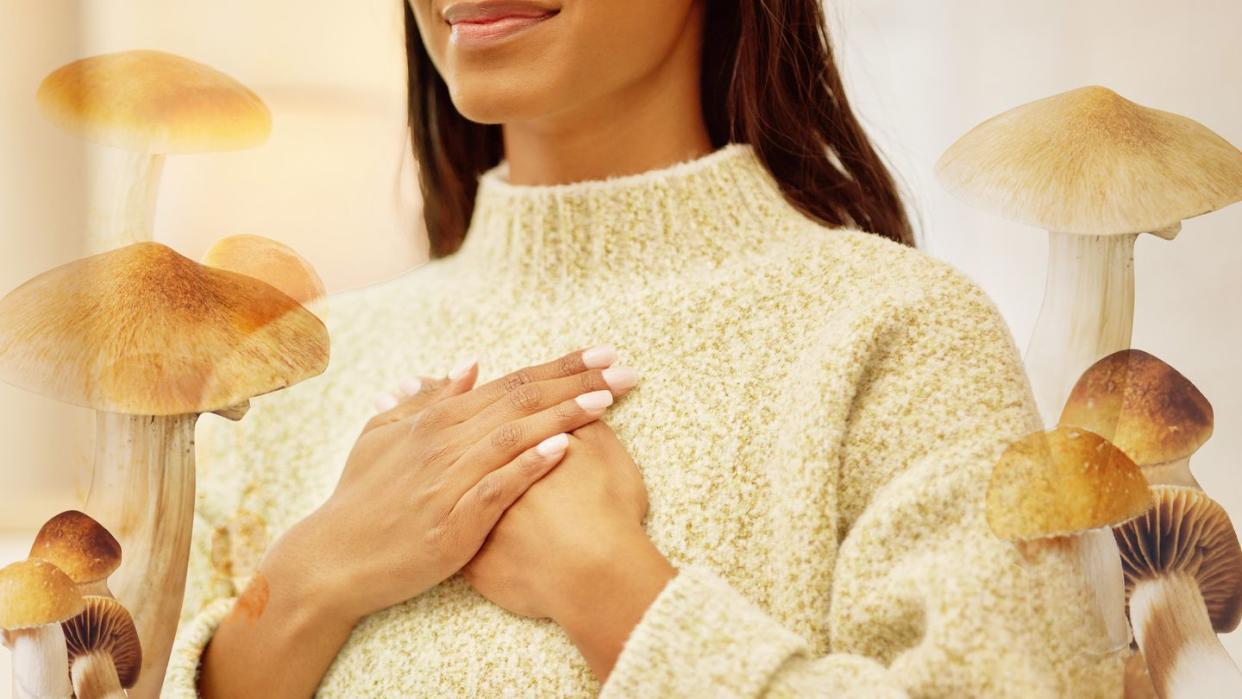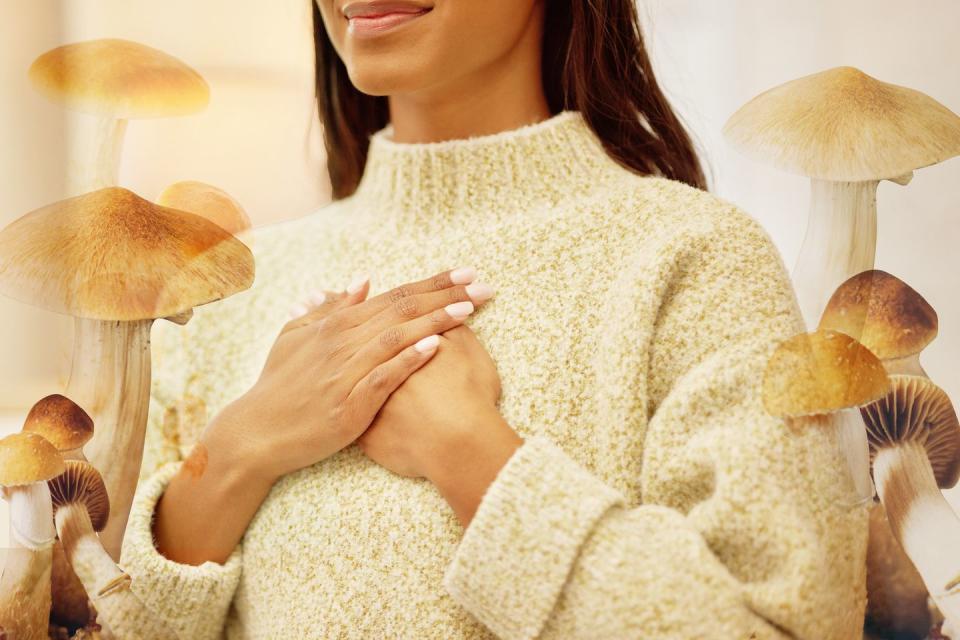Are All the Moms Microdosing Without Me?

"Hearst Magazines and Yahoo may earn commission or revenue on some items through these links."

One of my earliest memories is sitting on my mother’s lap—it must have been around 1973—waving plumes of her True cigarette smoke out of my face. She was just over 40, a former career gal turned stay-at-home mom to my brother and me, with a whiskey and soda in her hand by 5 p.m. every day.
It’s been almost 50 years, I’ve got two kids of my own, and it is five o’clock somewhere—or so I tell myself as I pour a glass of wine and survey my domestic hellscape of laundry, deadlines, homework, and general anxiety about, say, the economy, politics, and what the heck we’re going to do about the latest hurricane. What has changed is our mother’s little helper. At least that’s what I’m hearing from my parenting pals: Forget wine. Forget gummies. Try mushrooms. Not the $25-a-pound at the farmers’ market kind, or the fix-everything functional kind. They mean teeny-tiny doses of psychedelic mushrooms.
The regimen—as those in the know call it—involves taking about a tenth of a regular dose (100 to 300 milligrams of dried mushroom) on a steady basis (say, one day on, two days off, for four to eight weeks). And no, it’s not supposed to make flowers talk in tongues or the clouds reveal your destiny. But it is said to improve mood, lower stress, and reduce anxiety. “Everything looked bright and beautiful, but there was no hallucinating,” a mom I’ll call Diana reported. “That underlying feeling of stress and agitation I had [as a parent]—it was gone.”
The more I heard, the more curious I got. My husband and I have just bought a house, moved to a new town, and enrolled a tween and a teen at new schools. It’s been…a lot. I feel the effects in my mind, body, and spirit. I feel beat up. Could microdosing help? What would it be like? Would the boxes all over my living room start talking to me? Or would I just feel…better?
_________________
The movement to legalize psychedelics for medicinal use is robust and growing. Measures to decriminalize personal use are moving through the system in over a dozen states, though it’s only actually legal in Oregon and Colorado; a handful of other municipalities have scattershot rules that cover buying spores, growing shrooms, taking them yourself, and selling them to others.
And yet, moms all over the country who micro have found a whisper network of friends of friends to supply them, as state law (not to mention science) catches up with what users swear is therapeutic (and what Indigenous peoples have known for millennia). Lisa, a mother of three in Colorado, was one of the first people I spoke with. When she turned 40 a couple of years ago, she found herself spiraling into depression and anxiety amid the demands of motherhood and the lingering effects of old trauma.
“A lot of women struggle with the same types of things, but we’re already in situations where we have partners, kids, jobs,” she said. “We can’t just leave, like Eat Pray Love. But I needed to find myself again.”
It took a few tries with different varieties and regimens—of which there are many—until she found a formula that worked. “As a parent, I always felt like no one was happy, I wasn’t doing anything right, I was anxious and worried about the world and the kids in the world. And it lifted after three to four weeks of being consistent with the microdosing. It brought the joy back into it for me.”
I heard a similar tale from Brooklyn-based artist and writer Christen Clifford, the mother of two teenagers who was recently separated, in recovery from cancer, and suffering from depression (and the side effects of antidepressants). In her case, an occasional macro dose of mushrooms—enough for the traditional, hallucinatory “trip”—led her to try microdosing. The combo offered a way out of what seemed like a thicket of despair. “I think [mushrooms] help make me a better person,” she mused. “If it helps me love and accept myself more, [then] it helps me be a better guide for my kids to love and accept themselves.”
Clifford, who grows her own mushrooms legally in another state, weighs, grinds, and encapsulates her own doses. Her approach is likely outside the wheelhouse of those of us who can’t even keep their basil alive on the windowsill—but then again, if I could manage 18 hours of driving a week for travel soccer while writing a novel and providing 86 meals a week (even if some of them are bowls of Cheerios), maybe growing my own is in the realm of possibility.
“I’m definitely more present and enjoy my kids more,” echoed Anna, a 41-year old director who microdoses on a regular schedule (four days on, three days off). “I’m able to self-regulate better, and co-regulate with my kids, helping them calm down when they’re upset. And I’m a little less critical of my wife.
“I used to be pissed off when we went on a hike and my little one fell asleep and I had to carry her,” Anna recalled. “But [now] I’m able to hold her and feel accepting, like, She’ll be 14 some day. I can just enjoy this.”
All this sounded great to me, but I was still dubious about side effects and long-term impact. Would I wake up one day and find myself wandering the streets of my new suburb, chatting up the neighbors’ azaleas?
“I don’t like saying ‘psychedelics for all,’” psychiatrist Ellen Vora, MD, told me. “And not just from a medical or legal standpoint. It’s not the right agent for all brains.” The presence of, say, schizophrenia or bipolar disorder in your immediate family, for instance, can mean that psychedelics might do you more harm than good.
Lea Lis, MD, a member of the American Psychiatric Association’s Board of Trustees, who started a practice in the posh hamlet of Southampton, New York, exclusively for psychedelic therapy, is enthusiastic about the potential for psychedelics but cautions against flying solo when it comes to these substances. “As providers,” she told me, “we must be there for integration”—the process of taking the insights gained while under the influence and weaving them into daily life. “If people are working independently, I’d encourage them to find a psychedelic shaman in their community.”
I tried not to laugh. Should I google “shaman near me”? Check Facebook marketplace? See if I have a LinkedIn connection? Plus, calling yourself a shaman does not mean you’re a shaman, a major hurdle for me, along with my concern about the potential for health repercussions down the line.
“At the micro level, psychedelics are unlikely to really cause a lot of harm,” Lis said. “You might decide you don’t like it, it’s not for you.”
After talking myself hoarse, and weighing the risks and benefits, I turned to science. Last year, an oft-cited study found that microdosing “significantly increased a number of psychological measures, such as well-being and life satisfaction.” Woot!
Then I read on: “Participants taking placebo also improved: There were no significant differences between the two groups.” Wait, what? Placebo effect?
I frantically emailed Robin Carhart-Harris, PhD, one of the study’s coauthors, to ask about all the moms who told me microdosing made their lives better. Carhart-Harris has a doctorate in psychopharmacology; is a professor of neurology, psychiatry, and behavioral sciences at UCSF; and directs the psychedelics division at Neuroscape, UCSF’s “translational science center.” The man knows his way around a microdose.
“The placebo effect is potent,” he sternly informed me. “There is pretty good evidence that psychological assumptions—such as that we’re on a drug when we’re not—affect brain function.” Was this the answer? Should I take pretend-mushrooms? If I knew they were pretend, though, would the shrooms even work?
“The original idea with microdosing was that you should not feel any classic psychedelic effects but still gain something in terms of improvements in well-being and mental functioning,” Carhart-Harris added. “Evidence supporting these ideas is currently weak.”
That settled it for me: I was afraid of breaking the law, I didn’t know how to find a shaman, and the medical establishment still had questions about the efficacy of microdosing.
Even so, Lisa’s words stuck with me. Psychedelics, she said, helped her “really be with my people, my family. To cherish them as the people they are, and not be so caught up in the minutiae. We need to do what helps us cope and feel better and find joy.”
I’ll raise a glass—or maybe, one day, a dose—to that.
You Might Also Like

